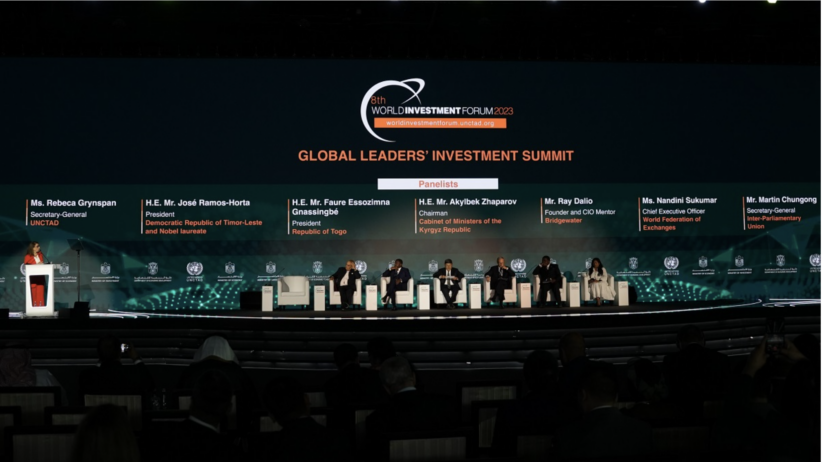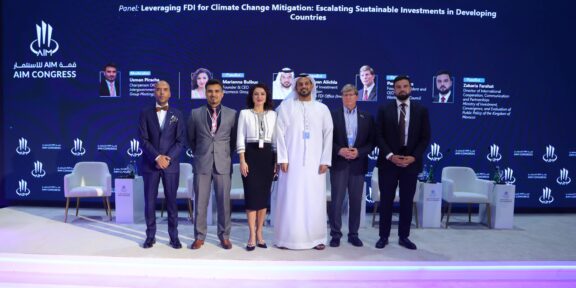UNCTAD’s 8th World Investment Forum opened on 16 October in Abu Dhabi, United Arab Emirates, focusing on the investment challenges faced by the world’s developing countries amid today’s global crises.
UN Secretary-General António Guterres, in a statement, urged participants – heads of state, business leaders, sustainable stock exchanges, sovereign wealth funds and experts – to put the Sustainable Development Goals (SDGs) Stimulus Package into effect and work towards delivering $500 billion annual investment for developing countries.
He also called on governments to establish a fair price on carbon and companies to implement credible net-zero plans, aligning with the recommendations of the High-Level Expert Group on the Net-Zero Emissions Commitments of Non-State Entities.
With the theme “Investing in Sustainable Development,” the forum strategically aligns with the upcoming global climate change talks at COP28. A dedicated track within the forum will focus on advancing climate finance and investment, providing a crucial platform for policymakers to find solutions and support global climate negotiations.
The opening ceremony featured the Crown Prince of Abu Dhabi, Sheikh Khaled bin Mohamed bin Zayed Al Nahyan, the Secretary-General of UNCTAD, Rebeca Grynspan, the Deputy Ruler of Dubai, Sheikh Maktoum bin Mohammed bin Rashid Al Maktoum, the President of Timor-Leste and Nobel laureate, José Ramos-Horta, and the President of Togo, Faure Essozimna Gnassingbé, setting the stage for the weeklong event.
Global leaders tackle funding gap
The opening-day Global Leaders Summit addressed the $4 trillion SDG investment gap, as only 15% of the goals are on target to be met by 2030, with the investment gap in the developing world growing from $2.5 trillion per year in 2015 to $4 trillion today.
The summit revealed a staggering $6 trillion valuation for the sustainable finance market.
However, Secretary-General Grynspan pointed out: “Not enough funds are going into new renewable energy plants, water and sanitation installations, agricultural projects, hospitals. And only 5% of all sustainable funds are located in developing countries. Funding exists, but allocation has been misguided.”
Leaders, including German Vice Chancellor Robert Habeck, discussed ways to close the SDG investment gap, mobilize sustainable finance in global capital markets, ensure sustainability standards in sustainable finance and channel more funds to where they’re needed most.
The discussion emphasized the key need for international coordination given the scale of the investment needs and blended finance involving both public and private sectors including new actors such as sovereign wealth funds.
The forum spotlighted critical sectors, such as the just energy transition and perspectives from countries like Indonesia, South Africa and Viet Nam.
Urgent need to invest in agrifood sector
On World Food Day, amid global supply chain disruptions from the COVID-19 pandemic and the conflict in Ukraine, UNCTAD and the Food and Agriculture Organization of the United Nations (FAO) highlighted the critical role agrifood systems play in tackling global malnutrition, poverty, the loss of biodiversity and ecosystem services, and climate change.
FAO Director-General Dongyu Qu said transforming agrifood systems will cost $680 billion annually between now and 2030 in low and middle-income countries.
There’s therefore a critical need to attract efficient public and private sector investment in agrifood systems to reduce food insecurity and foster rural employment, particularly for women and young people.
Channelling greater investment in sustainable finance in global capital markets to food production where it’s needed most will require addressing the challenges of risk, institutional capacity, investment promotion and ease of doing business.
UN Investment Promotion Awards 2023 celebrate success in climate action
Ten investment promotion agencies and special economic zones received the Investment Promotion Awards 2023, with winners from Brazil, China, Egypt, France, India, Namibia, the Republic of Korea, South Africa, Türkiye, and the United Arab Emirates.
This year’s awards spotlight the work of investment promotion agencies in attracting investment to accelerate the transition to clean, sustainable energy aimed at curbing climate change, while recognizing innovative approaches to investment promotion, finance and partnerships.
While international investment in renewable energy has nearly tripled since the adoption of the Paris Agreement in 2015, much of the growth has been concentrated in developed countries.






